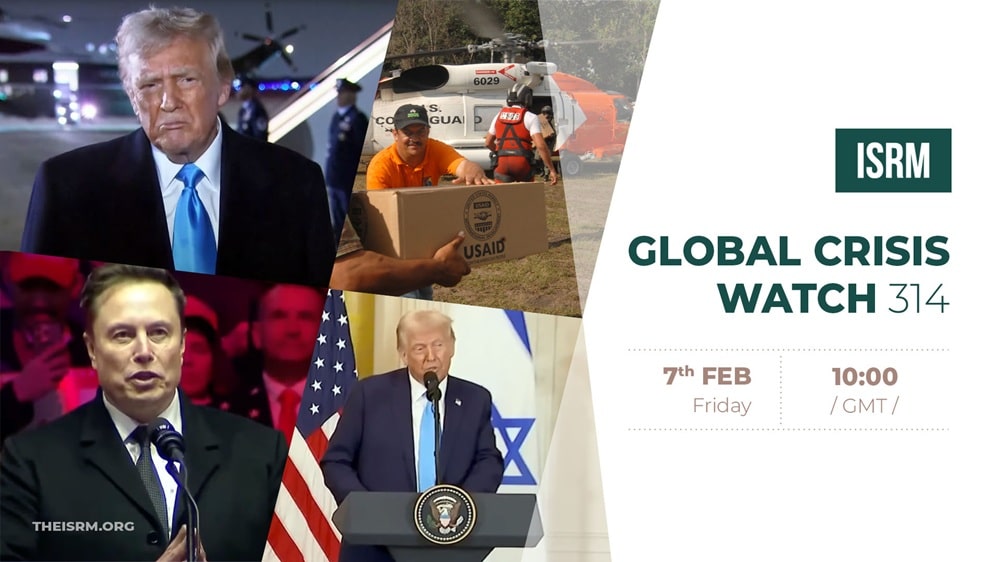The Institute of Strategic Risk Management (ISRM), has announced its latest Global Crisis Watch, number 314, where highlighted topics will include, the cutting of US foreign aid, which is worsening humanitarian crises around the world, Trump’s geopolitics real estate vision, with his proposed takeover of Greenland and Gaza, Trump’s suspension of US tariffs against Canada and Mexico, and Musk and Trump’s efforts to reshape Federal Agencies raise legal and constitutional concerns. It takes place tomorrow, Friday, February 7, 2024 at 10:00 GMT. See the topics in detail below.
US Aid cuts leave millions without food, water and healthcare
The US foreign aid freeze under the Trump administration is worsening humanitarian crises worldwide, cutting off funding for essential programs in conflict zones such as Ukraine, Sudan, Afghanistan and parts of Africa. The decision has left billions of dollars in aid stalled, despite existing waivers meant to prevent major disturbances. As a result, food distribution, healthcare and lifesaving assistance have been halted, affecting millions of vulnerable people.
In Sudan, where famine looms due to ongoing civil war, food kitchens that once served hundreds of thousands have shut down. Humanitarian workers warn that without immediate aid, malnutrition and starvation will skyrocket. Malaria prevention programs in Africa have also been suspended, increasing the risk of disease outbreaks that could spread globally. In Kenya, projects securing clean water supplies are under threat, worsening drought-related migration and creating new opportunities for extremist groups to recruit among displaced populations.
Afghanistan has seen a devastating rollback in women’s healthcare, education and protection services. The absence of US aid further entrenches the Taliban’s rule, leaving women and girls with limited access to medical care and personal safety resources. In Ukraine, the lack of US funding is destabilizing food security, heating and independent media operations, hampering the country’s resilience amid war.
The freeze also affects US strategic interests, weakening America’s global influence. Experts warn that by undermining efforts to curb migration, extremism and public health threats, the aid suspension ultimately threatens regional stability, harms US allies and weakens Washington’s ability to lead on the world stage.
From Greenland to Gaza: Trump’s geopolitical real estate vision
US President Donald Trump has suggested that the United States should “take over” the Gaza Strip and redevelop it into a luxury resort destination comparable to the French Riviera. He described Gaza as uninhabitable and claimed that Palestinians should be relocated elsewhere in the Middle East, a statement that has drawn widespread criticism from the international community. His comments echo previous proposals he made about acquiring Greenland, parts of Canada and the Panama Canal, reflecting his tendency to view geopolitics through a business and real estate lens.
The proposal was met with immediate backlash from Arab nations, particularly Saudi Arabia, Egypt and Jordan, which have strongly opposed any forced displacement of Palestinians. The idea also sparked condemnation from Palestinian leaders, with Hamas calling it a “recipe for chaos” that would escalate tensions in an already volatile region. Meanwhile, the Palestinian Authority reiterated that the only viable solution remains an independent Palestinian state alongside Israel.
Within Israel, Prime Minister Benjamin Netanyahu has not directly commented on Trump’s remarks, but some far-right Israeli politicians welcomed the idea, seeing it as aligned with their own aspirations for greater Israeli control over Palestinian territories. However, many Israeli security experts dismissed the proposal as unrealistic and dangerous, warning it could worsen regional instability.
The broader international community, including China, Russia and European leaders, quickly reaffirmed their commitment to a two-state solution, rejecting Trump’s vision as both impractical and contrary to international law. US lawmakers from both parties also criticized the remarks, with many warning that such rhetoric undermines diplomatic efforts in the region.
Critics argue that Trump’s approach to foreign policy reduces complex geopolitical conflicts to transactional business deals, disregarding historical grievances, international law and human rights concerns. Meanwhile, concerns grow that his comments could strengthen extremist factions and further complicate the already fragile situation in Gaza and beyond.
Trump halts tariffs on Canada and Mexico, faces retaliation from China
President Trump has temporarily paused the imposition of 25% tariffs on Canadian and Mexican imports for 30 days after securing agreements to address issues like illegal immigration and drug trafficking. In exchange, Canada will enhance border security with the appointment of a fentanyl czar and additional resources, while Mexico will deploy 10,000 National Guard troops along its northern border. The pause aims to prevent a trade war, but critics argue that the outcomes could have been achieved without the tariff threats, questioning the effectiveness of such tactics. Additionally, Trump’s decision to impose a 10% tariff on Chinese imports has triggered retaliatory actions from Beijing.
The temporary suspension of tariffs provides some relief but raises concerns about the long-term viability of these agreements. Economists warn that tariffs could increase prices on everyday goods like cars, lumber and food. Critics also note that Trump’s approach risks damaging relationships with neighboring countries, potentially eroding trust in future negotiations. Canadian Premier Andrew Furey and Ontario Premier Doug Ford have voiced concerns about the unpredictability of Trump’s tactics, pointing to the ongoing threat of future tariffs. This situation exemplifies Trump’s pattern of using dramatic measures to declare victories, even when tangible results are minimal.
Meanwhile, China has retaliated with targeted tariffs, including a 15% levy on US coal and liquefied natural gas (LNG), and 10% on agricultural machinery and vehicles. These countermeasures impact about $20 billion of US exports, a fraction of the $450 billion worth of Chinese goods affected by US tariffs. Despite the economic impact, China’s response aims to minimize disarray while sending a clear message to Washington.
Musk and Trump’s efforts to reshape Federal Agencies raise legal and constitutional concerns
Under the Trump administration, Elon Musk has emerged as a controversial figure at the helm of the newly established Department of Government Efficiency (DOGE). Through this role, Musk has been granted access to sensitive federal data, which has raised concerns over privacy and legal boundaries. His aggressive reform strategies have targeted key government agencies, most notably the Consumer Financial Protection Bureau (CFPB), USAID and the Department of Education. In what many see as a direct challenge to the independence of these agencies, Musk and Trump have moved forward with efforts to overhaul the structure of federal institutions, including appointing loyalists to leadership positions, overriding traditional governance conventions and sidestepping legal requirements for congressional approval.
Musk’s leadership has focused heavily on reducing perceived inefficiencies and corruption within the government. His outspoken criticism of agencies like USAID, which he has described as “evil,” has led to drastic measures, including the freezing of foreign aid and staff lockdowns, as well as proposals to merge USAID into the State Department. However, many legal experts argue that these efforts are unconstitutional, requiring Congressional approval for such drastic changes. Critics have raised alarms about Musk’s involvement in reshaping the US government, especially as his tactics increasingly bypass established oversight mechanisms and legal processes that traditionally ensure the independence and stability of government agencies.
Meanwhile, Trump has backed Musk’s push to eliminate or significantly restructure agencies like the CFPB, which was created to protect consumers, and the Department of Education. The focus on filling leadership roles with figures who align with their goals, and the use of executive orders to drive these changes, has drawn accusations that the Trump administration is dismantling key federal institutions and undermining their independence. While Trump and Musk argue that these moves are necessary to streamline operations, they have triggered legal disputes and growing fears that these efforts could lead to a permanent erosion of accountability in the federal government. As these controversial changes unfold, legal battles are likely to intensify, with Congress, unions and civil rights groups challenging the validity of these actions and the potential long-term consequences for the governance of federal agencies.
Register here
For more ISRM news, click here




